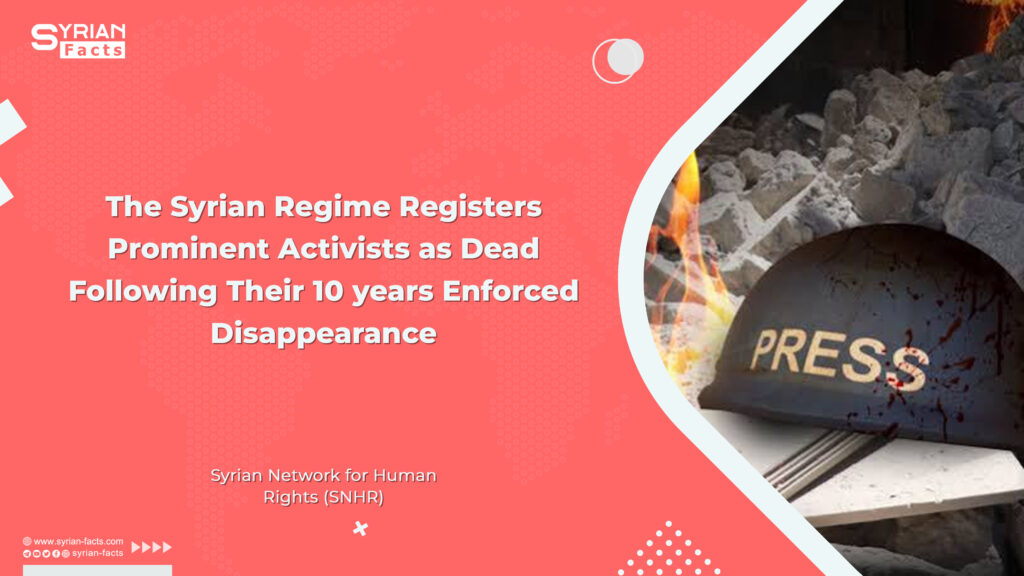No Fewer than 1,614 Forcibly Disappeared Persons Have been Registered by the Regime as Dead in the Civil Registry, with the Fate of 96,000 Others Still Unknown
The Syrian Network for Human Rights (SNHR) today released a report entitled, ‘The Syrian Regime Registers Prominent Activist Brothers Muath and Qusai Burhan as Dead in the Civil Registry Following Their Enforced Disappearance’, in which the group notesthat no fewer than 1,614 forcibly disappeared persons have been registered by the regime as dead in the civil registry, with the fate of 96,000 others still unknown.
The report stresses that the Syrian regime’s barbaric approach to the issue of forcibly disappeared persons persists. Not only is the regime responsible for the enforced disappearance of over 96,000 Syrian citizens, some of whom have been forcibly disappeared for years, but it has been registering some of these individuals as dead in the civil registry’s records since 2018, without notifying the victims’ families in many cases. The report reveals that, on November 9, SNHR acquired a document certifying that brothers Qusai and Muath Burhan had died in regime custody.
According to the document, obtained from the civil registry office in Rural Damascus or ‘Rif Dimashq’ governorate, Qusai died on January 31, 2014, while Muath died a couple of weeks later on February 16, 2014, with no other details provided, as is the case with the overwhelming majority of death certificates SNHR obtained on forcibly disappeared persons, copies of which are stored of in the group’s records.
The report notes that Qusai and Muath Abdul Rahman Burham, who were activists in the peaceful civilian movement, born in 1991 and 1992 respectively in al-Zabadani city in northern Rural Damascus governorate. The two brothers were arrested by the Syrian regime’s Raid Squad (Division 215), when they were detained along with a group of seven other activists. The activists were arrested in a nighttime raid on New Year’s Eve, December 31, 2013, in the Rukn al-Din neighborhood of Damascus city. They were taken to a detention center in Damascus governorate, and have been classified as forcibly disappeared ever since, with the regime denying any knowledge of their whereabouts, or allowing anyone to visit them, even a lawyer. The report adds that Qusai and Muath Abdul Rahman Burhan gained some renown with the outbreak of the popular uprising for democracy in March 2011, becoming known for their political and peaceful civilian activism, particularly for filming and broadcasting demonstrations. The two brothers were also involved in many activities that promoted pacifism, rejecting the destruction of government institutions, advocating for nonviolence, and presenting flowers and bottles of water to armed security personnel deployed by the regime to crush demonstrations in Damascus city. Qusai and Muath were co-founders of ‘Tajammuʻ alshshabāb alssūrī alththāʼr’ (Syrian Uprising Youth Assembly) in Damascus city. For these reasons, Qusai and Muath, and other similar activists, were viewed as a threat and seen as strategic targets by the regime, which devoted all of its power and resources to hunting them down and arresting them with no legal justification, then forcibly disappearing them in its detention centers.
As the report further reveals, Qusai died one month after his arrest, while Muath died 48 days after his arrest, 16 days after his brother. The report suspects that Qusai & Muath died due to torture in Branch 227, also known as the ‘al-Manteqa Branch’, in Damascus city, which is affiliated with the Syrian regime’s Military Intelligence Directorate, after they had been transferred there from Branch 215. The report stresses that the Syrian regime bears serious and binding responsibility for revealing the fate of all those forcibly disappeared by its forces, and for launching independent investigations, to be held under the supervision of the UN, in order to reveal the reality of the violations those victims have been subjected to. The regime is also responsible for holding those responsible accountable and for returning the victims’ bodies to their families, so that they can be buried in a proper and dignified way. The Syrian regime’s mechanism of revealing the demise of some of those victims through the civil registry fails to properly clarify their fate, but serves as further damning evidence against the regime, which is responsible for their arrest and disappearance, despite its implausible denials of responsibility for those events, and which registers their deaths at the state civil registry which it controls.
Moreover, the report notes that, since the beginning of 2018, the Syrian regime has been registering the deaths of many forcibly disappeared persons in its detention centers =in the civil registry’s records. On this subject, the report documents the the registration of the deaths of no fewer than 1,614 of the individuals forcibly disappeared in regime detention centers, including 24 children, 21 women, and 16 medical personnel. The cause of death has not been revealed in any of these cases, while the victims’ bodies have not been returned to the families, and their deaths were not publicly registered at the time they took place. Among these cases are four of the victims who were identified in the photographs leaked from the Syrian regime’s military hospitals, also known as the ‘Caesar Photographs’.
The report stresses that, in these cases, the Syrian regime has categorically committed massive numbers of violations, most notably the deliberate disappearance of approximately 71 percent of those documented as having been detained. The Syrian regime has also subjected these detainees to the most sadistic, horrendous, and bestial torture methods, and left them to die, suffering unspeakable agony, in inhuman conditions. In addition, the Syrian regime has subjugated and terrorized the detainees’ already traumatized families and wider Syrian society by denying them even the most minimal of rights and human dignity by not notifying them of their loved ones’ deaths, refusing to return their bodies, and ultimately registering these victims as dead without their families’ knowledge. The Syrian regime has used the Syrian state’s resources and institutions as weapons of war against anyone who dares to oppose it. The report adds that the Syrian regime has failed to uphold any of its obligations to the international instruments and conventions it had ratified, particularly, the International Covenant on Civil and Political Rights. Moreover, the Syrian regime has contravened multiple articles in the Syrian constitution that the regime itself devised, persisting with the detention of hundreds of thousands of detainees for years, even while refusing to issue any arrest warrant, or bring any charges against these detainees, who have also been denied any opportunity to appoint a lawyer or receive visits from their families. Approximately 68.25 percent of all detainees in regime detention centers have been classified as enforced disappearance cases following their arrest, with their families not notified of or allowed any information on their whereabouts. Usually, when the family enquires about such information, security branches and other regime authorities deny any knowledge of the whereabout of the detainees in question. That is without even mentioning the very real danger of detainees’ relatives being arrested themselves simply for enquiring about their loved ones.
The report calls on the UN Security Council and the UN to protect tens of thousands of detainees and forcibly disappeared persons in regime detention centers from the threat of dying under torture and to save whoever is left. The report also calls for devising ways and mechanisms to stop the Syrian regime’s tampering with the records of the living and the dead, which poses a major threat to the security and stability of the Syrian state.
Additionally, the report calls on the allies of the Syrian regime, Russia and Iran, to end their support for a regime that has been involved in forcibly disappearing over 95,000 Syrian persons, since such support entails implication and complicity in crimes against humanity, in addition to making other recommendations.





Be the first to write a comment.